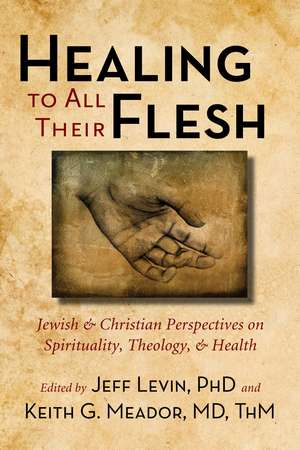Healing to All Their Flesh – Jewish and Christian Perspectives on Spirituality, Theology, and Health
Autor Jeff Levin, Keith Meadoren Limba Engleză Paperback – 13 sep 2012
Healing to All Their Flesh asks us to step back and carefully rethink the relationship between religion and health. It does so by examining overlooked issues of theology and meaning that lie at the foundation of religion’s supposed beneficial function. Is a religion-health relationship consistent with understandings of faith within respective traditions? What does this actually imply? What does it not imply? How have these ideas been distorted? Why does this matter—for medicine and healthcare and also for the practice of faith? Is the ultimate relation between spirit and flesh, as mediated by the context of human belief and experience, a topic that can even be approached through empirical observation, scientific reasoning, and the logic of intellectual discourse?8 pag e photo insert
The editors of this collection, Drs. Jeff Levin and Keith G. Meador, have gathered together the writings of leading Jewish and Christian theological, pastoral, ethical, and religious scholars to answer these important questions. Contributors include Richard Address, William Cutter, Elliot N. Dorff, Dayle A. Friedman, Stanley Hauerwas, Warren Kinghorn, M. Therese Lysaught, Stephen G. Post, John Swinton, and Simkha Y. Weintraub, with a foreword by Samuel E. Karff.
Preț: 450.22 lei
Nou
Puncte Express: 675
Preț estimativ în valută:
86.15€ • 89.95$ • 71.30£
86.15€ • 89.95$ • 71.30£
Carte indisponibilă temporar
Doresc să fiu notificat când acest titlu va fi disponibil:
Se trimite...
Preluare comenzi: 021 569.72.76
Specificații
ISBN-13: 9781599473758
ISBN-10: 1599473755
Pagini: 304
Dimensiuni: 152 x 229 x 23 mm
Greutate: 0.41 kg
Ediția:First Edition, 1
Editura: Wiley
ISBN-10: 1599473755
Pagini: 304
Dimensiuni: 152 x 229 x 23 mm
Greutate: 0.41 kg
Ediția:First Edition, 1
Editura: Wiley
Cuprins
Foreword / ix
Rabbi Samuel E. Karff, DHL
Rabbi Samuel E. Karff, DHL
Acknowledgments / xiii
Prologue. The Intersection of Spirituality, Theology, and Health / 3
Jeff Levin
Jeff Levin
Part 1: Jewish Perspectives
1. Cure and Healing, Where God Met Science: Four Decades of Spiritual Progress / 17
William Cutter
William Cutter
2. Contemplating a Theology of Healthy Aging
Richard Address / 26
Richard Address / 26
3. Dwindling or Grateful: Toward a Resilient Old Age / 52
Dayle A. Friedman
Dayle A. Friedman
4. Using Jewish Law to Respond to Contemporary Issues in Bioethics / 65
Elliott N. Dorff
Elliott N. Dorff
5. Give Me Your Hand: Exploring Judaism’s Approach to the Relationship of Spirit and Health / 97
Simkha Y. Weintraub
Simkha Y. Weintraub
Part 2: Christian Perspectives
6. St. Thomas Aquinas and the End(s) of Religion, Spirituality, and Health / 123
Warren Kinghorn
Warren Kinghorn
7. Beguiling Religion: The Bifurcations and Biopolitics of Spirituality and Medicine / 150
M. Therese Lysaught
M. Therese Lysaught
8. The Ontological Generality in Spirituality and Health / 186
Stephen G. Post
Stephen G. Post
9. From Health to Shalom: Why the Religion and Health Debate Needs Jesus John / 219
Swinton
Swinton
10. Suffering Presence: Twenty-Five Years Later / 242
Stanley Hauerwas
Stanley Hauerwas
Epilogue. Theology and Health: Challenges and Possibilities / 259
Keith G. Meador
Keith G. Meador
About the Contributors / 271
Index / 272
Descriere
Healing to All Their Flesh asks us to step back and carefully rethink the relationship between religion and health. It does so by examining overlooked issues of theology and meaning that lie at the foundation of religion’s supposed beneficial function. Is a religion-health relationship consistent with understandings of faith within respective traditions? What does this actually imply? What does it not imply? How have these ideas been distorted? Why does this matter—for medicine and healthcare and also for the practice of faith? Is the ultimate relation between spirit and flesh, as mediated by the context of human belief and experience, a topic that can even be approached through empirical observation, scientific reasoning, and the logic of intellectual discourse?
